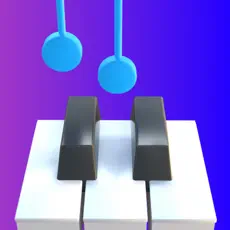Drops vs. Duolingo
Drops
Drops is a language learning app that focuses on teaching vocabulary through quick, visual-based games. The idea is to make learning feel more like playing, with short sessions you can fit into your day. Instead of grammar-heavy lessons, it leans on matching words with pictures, swiping, and tapping to help words stick in your memory. The app covers over 40 languages, from common ones like Spanish and French to less common ones like Hawaiian and Ainu. You get common, everyday words and phrases to start with—things you’d actually use in conversation. It’s built for people who want to learn at their own pace, and there are features like reminders and streaks to keep you coming back. Drops keeps lessons short—usually five minutes—so it’s easy to squeeze in some learning while waiting for coffee or riding the train. There’s a free version with ads and limits on daily use, or you can pay for Premium to get rid of ads, unlock all content, and use it offline. Overall, it’s not going to tea...
Duolingo
Duolingo is an app and website designed to help people learn languages in a simple and engaging way. It’s free to use, though there are paid options that remove ads and offer extra features. The lessons are short and interactive, with exercises that involve matching words, listening to sentences, speaking, and translating. A green owl named Duo acts as the app’s mascot—offering encouragement when you stay on track and reminders when you don’t. The platform offers a wide range of languages, from widely spoken ones like Spanish, French, and Chinese to less common choices like Welsh, Hawaiian, and even fictional languages like Klingon and High Valyrian. Lessons focus on practical, everyday communication—like ordering food or asking for directions—though you’ll occasionally encounter quirky sentences that are memorable in their oddness. Duolingo adapts to your progress: if you’re struggling, it slows down; if you’re doing well, it introduces more challenging material. There are game-like...
Reviews
Reviewed on 2/25/2025
Drops is a language learning app similar to Duolingo, except it has many of the languages that Duolingo doesn't support, such as Thai. It mostly focuses on teaching you new words, with a catalogue of 2,000+ words divided into categories. It comes with exercises to help you improve your reading, listening, and writing skills. It's a bit light on grammar but is a good place to pick up some basic words and learn to make simple sentences.
Reviews
Reviewed on 1/27/2025
I love Duolingo but I don't love the ads. There are too many of them and they completely kill my flow :(

| Item | Votes | Upvote |
|---|---|---|
| No pros yet, would you like to add one? | ||
| Item | Votes | Upvote |
|---|---|---|
| Not as good as Duolingo | 1 | |
| Repetitive | 1 |
| Item | Votes | Upvote |
|---|---|---|
| No pros yet, would you like to add one? | ||
| Item | Votes | Upvote |
|---|---|---|
| Ads | 1 |
Frequently Asked Questions
Drops is a good option for learning vocabulary in languages that Duolingo does not support, such as Thai. However, it is considered not as comprehensive as Duolingo, which offers a more structured approach to language learning, including grammar and a wider range of languages. If you are looking for a more in-depth learning experience, Duolingo may be the better choice.
Yes, Drops offers a variety of languages that Duolingo does not support, making it a suitable choice for learners interested in less commonly taught languages. However, Duolingo provides a more comprehensive learning experience for the languages it does offer, including grammar and structured lessons.
Duolingo is generally considered more effective for beginners due to its structured lessons that cover vocabulary, grammar, and pronunciation. Drops focuses primarily on vocabulary acquisition, which may not provide a complete foundation for beginners looking to learn a new language.
Yes, some users find the learning experience with Drops to be repetitive, as it emphasizes vocabulary through similar exercises. In contrast, Duolingo offers a variety of interactive exercises that may keep learners more engaged and provide a more dynamic learning experience.
Drops is a language learning app that focuses on teaching vocabulary through quick, visual-based games. It covers over 40 languages and emphasizes learning common, everyday words and phrases through engaging activities like matching words with pictures, swiping, and tapping. The app is designed for short, five-minute sessions, making it easy to fit into your daily routine.
Pros of Drops include its engaging, game-like approach to learning vocabulary and its coverage of over 40 languages, including some less common ones. However, some cons noted by users are that it is not as comprehensive as Duolingo and can feel repetitive over time.
Drops is similar to Duolingo in that both are language learning apps, but Drops focuses more on vocabulary acquisition rather than grammar. While Duolingo offers a more comprehensive language learning experience, including grammar lessons, Drops is better suited for users looking to quickly build their vocabulary in a fun and engaging way.
Drops offers features such as short lesson sessions, reminders, and streaks to encourage daily practice. The app has a free version with ads and limitations on daily use, while a Premium subscription removes ads, unlocks all content, and allows offline access.
With Drops, you can learn a variety of common, everyday words and phrases that are useful in conversation. The app has a catalogue of over 2,000 words divided into categories, making it easier to focus on specific topics or themes.
Duolingo is an app and website designed to help people learn languages in a simple and engaging way. It offers a wide range of languages, from popular ones like Spanish and French to less common choices like Welsh and even fictional languages like Klingon. The lessons are short, interactive, and focus on practical communication skills.
The main pro of Duolingo is its engaging and interactive approach to language learning, making it convenient and easy to use. However, a notable con is the presence of ads, which some users find disruptive to their learning experience.
Duolingo adapts to your progress by adjusting the difficulty of lessons based on your performance. If you are struggling, it slows down the pace, while if you are doing well, it introduces more challenging material to keep you engaged.
Duolingo offers various features to enhance language learning, including game-like elements such as points, streaks, and levels. Additionally, it provides podcasts, stories, and interactive exercises to improve listening and reading comprehension.
Yes, Duolingo is convenient and easy to use, allowing you to practice language skills almost anywhere—whether on the bus, during a lunch break, or before bed.





















